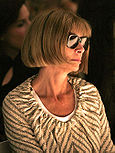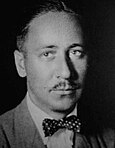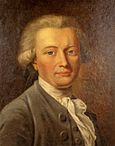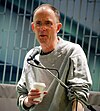Portal:Journalism/Selected biography
| This Wikipedia page has been superseded by Portal:Journalism and is retained primarily for historical reference. |
| Note: Article entries are now being transcluded directly on the main portal page. However, this page should be retained for historical reference. |
Instructions
The layout design for these subpages is at Portal:Journalism/Selected biography/Layout.
- Add a new Selected article to the next available subpage.
- The "blurb" for all selected articles should be approximately 10 lines, for appropriate formatting in the portal main page.
- Update "max=" to new total for its {{Random portal component}} on the main page.
Selected biographies list
Selected biography 1
Portal:Journalism/Selected biography/1
Peter Charles Archibald Ewart Jennings, CM (July 29, 1938 – August 7, 2005) was a Canadian-American journalist and news anchor. He was the sole anchor of ABC's World News Tonight from 1983 until his death in 2005 of complications from lung cancer. A high-school dropout, he transformed himself into one of television's most prominent journalists. Jennings started his career early, hosting a Canadian radio show at the age of nine. In 1965, ABC News tapped him to anchor its flagship evening news program. His inexperience marred his first short stint in the anchor chair, and Jennings became a foreign correspondent in 1968, honing his reporting skills in the Middle East. He returned as one of World News Tonight's three anchors in 1978, and was promoted to the role of sole anchor in 1983. Jennings formed part of the "Big Three" news anchors who dominated American evening news in the 1980s and 1990s. Having always been fascinated with the United States, Jennings became a dual citizen of Canada and the United States in 2003. His death, which closely followed the retirements of Tom Brokaw and Dan Rather, marked the end of the "Big Three" era.Selected biography 2
Portal:Journalism/Selected biography/2
Anna Wintour (born November 3, 1949, in London) is the editor-in-chief of American Vogue, a position she has held since 1988. She became interested in fashion as a teenager. Her father, Charles, editor of the Evening Standard, often consulted with her on how to make the newspaper's coverage relevant to the youth of mid-1960s London. After dropping out of school at 16, she began a career in fashion journalism. Her career took her across the Atlantic, with notable stints at New York and Home & Garden. She returned home for a tumultuous year to turn around British Vogue, and later assumed control of the franchise's flagship magazine in New York. She revived a stagnant publication, a success that has earned her wide acclaim in the industry. Like one of her predecessors, Diana Vreeland, she has become a fashion icon. Her pageboy bob haircut and sunglasses have become a common sight in the front row of the most exclusive fashion shows. Universally hailed for her keen eye for fashion trends and support for younger designers, her aloof and demanding persona has earned her the nickname "Nuclear Wintour". A former personal assistant, Lauren Weisberger, wrote the 2003 bestselling roman à clef The Devil Wears Prada, later made into a successful film starring Meryl Streep as Miranda Priestly, a fashion editor widely believed to be based on Wintour.Selected biography 3
Portal:Journalism/Selected biography/3
Mumia Abu-Jamal (born Wesley Cook on April 24, 1954) was convicted and sentenced to death for the 1981 murder of police officer Daniel Faulkner, and is currently a prisoner at State Correctional Institution - Greene near Waynesburg, Pennsylvania. In December 2001 a judge of the United States District Court for the Eastern District of Pennsylvania affirmed the conviction but quashed his original punishment and ordered resentencing. Both Abu-Jamal and the Commonwealth of Pennsylvania appealed. The case was orally argued before a three-judge panel in the U.S. Court of Appeals for the Third Circuit, Philadelphia on May 17, 2007, and is pending. His case has received international attention. Supporters and human rights campaigners variously assert that he is innocent, that he was set up, that he did not receive a fair trial, and/or oppose the death penalty. Opponents assert that he is guilty, that he received the benefit of due process and was legitimately convicted of murder. Execution proponents among these assert that under Pennsylvania law his eventual judicial execution is warranted and mandated by the nature of his crime. Prior to his arrest he was a Black Panther Party activist, cab driver, and journalist. During the period of his imprisonment he has courted controversy as an honoree of municipal, educational and civil society organizations, and as a spoken word commentator and published author of several works - most notably Live from Death Row.Selected biography 4
Portal:Journalism/Selected biography/4 Anna Stepanovna Politkovskaya (30 August 1958 – 7 October 2006) was a Russian journalist and human rights activist well known for her opposition to the Chechen conflict and Russian president Putin. Politkovskaya made her name reporting from lawless Chechnya, where many journalists and humanitarian workers have been kidnapped or killed. She was arrested and subjected to mock execution by Russian military forces there, and she was poisoned on the way to Beslan, but survived and continued her reporting. She authored several books about Chechen wars and Putin's Russia and received numerous prestigious international awards for her work. She was shot dead in the elevator of her apartment building on October 7, 2006.
Selected biography 5
Portal:Journalism/Selected biography/5
Hrant Dink (September 15, 1954 – January 19, 2007) was a Turkish-Armenian editor, journalist and columnist. As editor-in-chief of the bilingual Turkish-Armenian newspaper Agos (Ակօս), Dink was a prominent member of the Armenian minority in Turkey. Dink was best known for advocating Turkish-Armenian reconciliation and human and minority rights in Turkey; he was often critical of both Turkey's denial of the Armenian Genocide, and of the Armenian diaspora's campaign for its international recognition. Dink was prosecuted three times for denigrating Turkishness, while receiving numerous death threats from Turkish nationalists. Hrant Dink was assassinated in Istanbul in January 2007, by Ogün Samast, a 17-year old Turkish nationalist. While Samast has since been taken into custody, pictures of the alleged assassin flanked by smiling Turkish police and gendarmerie, posing with the killer in front of the Turkish flag, have since surfaced. The photos created a scandal in Turkey, prompting a spate of investigations and the removal from office of those involved. At his funeral, one hundred thousand mourners marched in protest of the assassination, chanting "We are all Armenians" and "We are all Hrant Dink". Criticism of Article 301 became increasingly vocal after his death, leading to parliamentary proposals for repeal.Selected biography 6
Portal:Journalism/Selected biography/6
Jay Barbree (born 1934) is a correspondent for NBC News, focusing on space travel. Barbree is the only journalist to have covered every manned space mission in the United States, beginning with the first American in space, Alan Shepard aboard Freedom 7 in 1961, continuing through to the most recent mission, Endeavour's STS-118 mission in August of 2007. Barbree has been present for 119 Space Shuttle launches, and every launch for the Mercury, Gemini, and Apollo eras. In total, Barbree has been witness to 150 manned space launches.Selected biography 7
Portal:Journalism/Selected biography/7
John Lawrence Seigenthaler (born July 27, 1927) is an American journalist, writer, and political figure.Seigenthaler joined The Tennessean in 1949 and became editor in 1962, publisher in 1973, and chairman in 1982 before retiring as chairman emeritus in 1991. Seigenthaler was also founding editorial director of USA Today from 1982 to 1991. During this period he served on the board of directors for the American Society of Newspaper Editors and from 1988 to 1989 was its president.
Selected biography 8
Portal:Journalism/Selected biography/8
John F. Stossel (born 6 March 1947) is a consumer reporter, author and co-anchor for the ABC News show 20/20. Stossel began his journalism career as a researcher for KGW-TV and later became a consumer reporter at WCBS-TV in New York City before joining ABC News as consumer editor and reporter on Good Morning America. Stossel went on to be an ABC News correspondent, joining the weekly news magazine program 20/20. In his decades as a reporter, Stossel has received numerous honors and awards. Stossel has also written two books entitled Give Me a Break and Myths, Lies, and Downright Stupidity. Stossel practices advocacy journalism where he often challenges "conventional wisdom". His reports, a blend of commentary and reporting, reflect a roughly libertarian political philosophy and his views on economics are largely supportive of the free market. This makes him a "contrarian" in American media and he has been targeted by left-wing organizations that disagree with him.Selected biography 9
Portal:Journalism/Selected biography/9
Mark Kellogg (March 31, 1831 – June 25, 1876) was a newspaper reporter killed at the Battle of the Little Bighorn. Kellogg rode with George Armstrong Custer during the battle and was evidently one of the first men killed by the Sioux and Cheyenne. His dispatches were the only press coverage of Custer and his men in the days leading up to the battle. As a newspaper stringer whose reports were picked up around the country, Kellogg is considered the first Associated Press correspondent to die in the line of duty.Selected biography 10
Portal:Journalism/Selected biography/10
Neal Boortz (born April 6, 1945), is a U.S. talk radio host, commentator, lawyer, and best-selling author. His popular radio show, The Neal Boortz Show, is based in Atlanta, Georgia. Nationally syndicated by Cox Radio and the Jones Radio Networks, it is ranked sixth in overall listeners, with 3.75 million per week. A registered member of the Libertarian Party, Boortz supports eliminating the war on drugs, lowering taxes, and shrinking the size of government, while disagreeing with the Libertarian Party platform by supporting incremental tax reform, the Iraq War, and opposing unrestricted immigration. Boortz has sided with liberals on some social issues such as abortion, same-sex marriage, and civil liberties, while siding with fiscal conservatives on advocating less government spending and decreasing corporate regulation. On The Neal Boortz Show, he has criticized politicians, Muslim extremism, the homeless, "government schools", liberals, smokers, the obese, cats, welfare recipients, and people who drive at or below the speed limit. In 2005, he co-wrote The FairTax Book, proposing to implement a national retail sales tax in lieu of federal income taxes, payroll taxes, estate tax, etc., and the hardcover version debuted at #1 on the New York Times bestseller list and held that spot for two weeks.Selected biography 11
Portal:Journalism/Selected biography/11
Robert Charles Benchley (September 15, 1889 – November 21, 1945) was an American humorist best known for his work as a newspaper columnist and film actor. From his beginnings at the Harvard Lampoon while attending Harvard University, through his many years writing essays and articles for Vanity Fair and The New Yorker, and his acclaimed short films, Benchley's style of humor brought him respect and success during his life, from New York City and his peers at the Algonquin Round Table to contemporaries in the burgeoning film industry. Benchley is best remembered for his contributions to The New Yorker, where his unique essays, whether topical or absurdist, influenced many modern humorists. He also made a name for himself in Hollywood, when his short film How to Sleep was a popular success and won Best Short Subject at the 1935 Academy Awards, and his many memorable appearances in films such as Alfred Hitchcock's Foreign Correspondent and a dramatic turn in Nice Girl?. His legacy includes written work and numerous short film appearances.Selected biography 12
Portal:Journalism/Selected biography/12
Stephen Tyrone Colbert (born May 13, 1964) is an American comedian, satirist, actor, and writer known for his ironic style, particularly in his portrayal of uninformed opinion leaders and deadpan comedic delivery. Colbert originally studied to be an actor, but became interested in improvisational theater when he met famed Second City director Del Close while attending Northwestern University. He first performed professionally as an understudy for Steve Carell at Second City Chicago; among his troupe mates were comedians Paul Dinello and Amy Sedaris, with whom he developed the critically-acclaimed sketch comedy series Exit 57. Colbert also wrote and performed on the short-lived Dana Carvey Show before collaborating with Sedaris and Dinello again on the cult television series Strangers with Candy. He gained considerable attention for his role on the latter as closeted, gay history teacher Chuck Noblet. It was his work as a correspondent on Comedy Central's news-parody series The Daily Show, however, that first introduced him to a wide audience. In 2005, he left The Daily Show to host a spin-off series, The Colbert Report. Since its debut, the series has been successful, earning Colbert three Emmy nominations and an invitation to perform as featured entertainer at the White House Correspondents' Association Dinner in 2006. Colbert was named one of Time's 100 most influential people in 2006.Selected biography 13
Portal:Journalism/Selected biography/13
Georg Forster (November 27, 1754 – January 10, 1794) was an 18th-century German naturalist, ethnologist, travel writer, journalist, and revolutionary. At an early age, he accompanied his father on several scientific expeditions, including James Cook's second voyage to the Pacific. His report from that journey, A Voyage Round the World, contributed significantly to the ethnology of the people of Polynesia and remains a respected work among both scientists and ordinary readers. As a result of the report Forster was admitted to the Royal Society at the age of 22 and he came to be considered one of the founders of modern scientific travel literature. Forster was a central figure of the Enlightenment in Germany, and corresponded with most of its adherents, including Georg Christoph Lichtenberg who was a close friend of his. His ideas and personality influenced strongly one of the greatest German scientists of 19th century, Alexander von Humboldt. In July 1793, while he was in Paris as a delegate of the young Mainz Republic, Prussian and Austrian coalition forces regained control of the city and Forster was declared an outlaw. Unable to return to Germany and separated from his friends and family, he died in Paris of illness in early 1794.Selected biography 14
Portal:Journalism/Selected biography/14
William Ford Gibson, born March 17, 1948, in Conway, South Carolina is an American-Canadian writer who has been called the "noir prophet" of the cyberpunk subgenre of science fiction. Gibson coined the term cyberspace in 1982, and popularized the concept in his debut novel, Neuromancer (1984). In depicting a visualised worldwide communications network before the ubiquity of the Internet, Gibson is credited with anticipating important aspects, and establishing the conceptual foundations, of the Internet and the Web in particular. Although much of Gibson's reputation has remained rooted in Neuromancer, his work has continued to evolve conceptually and stylistically. After expanding on Neuromancer with two more novels to complete the dystopic Sprawl trilogy, Gibson became central to an entirely new science fiction subgenre—steampunk—with the publication in 1990 of the alternate history novel The Difference Engine, written in collaboration with Bruce Sterling. In the 1990s he composed the Bridge trilogy of novels, which focused on sociological observations of near future urban environments and late stage capitalism. His most recent novels—Pattern Recognition (2003), and Spook Country (2007)—are both set in a contemporary universe and have put Gibson's work onto mainstream bestseller lists for the first time.Selected biography 15
Portal:Journalism/Selected biography/15
William Monahan is an American novelist, screenwriter and former journalist. Monahan went to work in Hollywood in 1998, when Warner Bros. bought the film rights to Light House: A Trifle, which had not yet been published, and contracted him to adapt it to the screen for director Gore Verbinski. In 2001, 20th Century Fox bought Monahan's spec script about the Barbary Wars called Tripoli, with Ridley Scott, who was to become Monahan's primary collaborator, attached to direct. Monahan, immediately successful as a screenwriter, has since worked with Martin Scorsese and Steven Spielberg, among other filmmakers. His first produced screenplay, Kingdom of Heaven was made into a film by Ridley Scott and released in theaters in 2005. His second produced screenplay was The Departed, a film which earned him a WGA award and an Academy Award for Best Adapted Screenplay. Monahan prefers that screenplays be written by one writer rather than a collaboration of multiple screenwriters writing competing drafts. Thus far he has followed his scripts through production, and is one of very few sole credit writers in the film business.Selected biography 16
Portal:Journalism/Selected biography/16
Bruno Maddox is a British literary novelist and journalist who is best-known for his critically lauded novel My Little Blue Dress (2001) and for his satirical magazine essays. After graduating from Harvard University in 1992, Maddox began his career reviewing books for The New York Times Book Review and The Washington Post Book World. In early 1996, he was appointed to an editorship at SPY magazine and within a few months he was promoted to editor-in-chief, a position he held until the magazine shut down in 1998. Maddox wrote My Little Blue Dress between 1999 and 2001. Since its publication, he has focused on writing satirical essays for magazines such as GEAR and Travel + Leisure; he also contributes a monthly humor column to Discover magazine called "Blinded by Science", drawing on his early exposure to science and technology. Maddox is likewise a contributing editor to the American edition of The Week magazine.Selected biography 17
Portal:Journalism/Selected biography/17
Ion Heliade Rădulescu was a Wallachian-born Romanian academic, Romantic and Classicist poet, essayist, memoirist, short story writer, newspaper editor and politician, as well as prolific translator of foreign literature into Romanian and the author of books on linguistics and history. For much of his life, he was a teacher at the Saint Sava College in Bucharest, which he helped reopen. He was a founding member of the Romanian Academy, and the first President thereof. Heliade Rădulescu is considered one of the foremost representatives of Romanian culture from the first half of the 19th century, having first become noted for his association with Gheorghe Lazăr and the latter's support for discontinuing education in Greek. Over the following decades, he had a major contribution in shaping the modern Romanian language, but raised controversy when he came to advocate the massive introduction of Italian neologisms to the Romanian lexis. A Romantic nationalist landowner siding with moderate liberals, he was among the leaders of the 1848 Wallachian revolution, after which he was forced to spend several years in exile. Adopting an original form of conservatism, which emphasized the role of boyars in Romanian history, Heliade Rădulescu was rewarded for supporting the Ottoman Empire, and came to clash with the radical wing of the 1848 generation.Selected biography 18
Portal:Journalism/Selected biography/18 David Helvarg is an American journalist and environmental activist. He is the founder and president of the marine conservation lobbying organization Blue Frontier Campaign, a part of the Seaweed rebellion, which arose from his second book, Blue Frontier. His first book, The War against the Greens, puts a case that violent organised resistance is being orchestrated against the environmental movement. Helvarg began his career as a freelance journalist before becoming a war correspondent and then returning to news journalism. He writes about politics, AIDS, and sea life. He has reported from every continent and he has been published in specialist and popular magazines, and US newspapers both locally and in syndication. His experience of military conflict, civil conflict and marine biology is the basis of his lobbying.
Selected biography 19
Portal:Journalism/Selected biography/19
Emmett Watson (November 22, 1918 – May 11, 2001) was a newspaper columnist in Seattle whose columns ran in a number of Seattle newspapers over a span of more than fifty years. Initially a sportswriter, he is primarily known for authoring a social commentary column for the Seattle Post-Intelligencer (P-I) from 1956 until 1982, when he moved to The Seattle Times and continued as a columnist until shortly before his death in 2001. Watson, who grew up in Seattle in the 1920s and 1930s, was a tireless advocate, through his column as well as through a fictional organization he created called Lesser Seattle, for limiting the seemingly unbridled growth and urban renewal that dramatically altered the Seattle landscape during the latter half of the twentieth century.Selected biography 20
Portal:Journalism/Selected biography/20 Michael Savage is the pseudonym of Michael Alan Weiner (born March 31, 1942), a controversial American conservative talk radio host, author, and political pundit. He holds master's degrees in medical botany and medical anthropology and earned a Ph.D. from the University of California, Berkeley, in nutritional ethnomedicine. As Michael Weiner, he has written a number of books on herbal medicine and homeopathy. As Michael Savage, he has written four New York Times best sellers. His nationally syndicated radio show, The Savage Nation, reaches more than ten million listeners on 410 stations throughout the United States, ranking third in number of stations syndicated nationwide and third in nationwide audience behind Rush Limbaugh and Sean Hannity. Though he spent much time with a more liberal crowd in the 1970s, he turned to what he calls "independent conservatism" during the 1980s. Savage is now known for his confrontational style and colorful language. He has said that there are three aspects that define a society: borders, language, and culture. Consequently, he is a critic of illegal immigration, a supporter of the English-only movement, and warns about what he says is the degradation of U.S. culture in the form of liberalism and same-sex marriage.
Selected biography 21
Portal:Journalism/Selected biography/21 Pauline Kael (June 19, 1919 – September 3, 2001) was an American film critic who wrote for The New Yorker magazine from 1968 to 1991. She was known for her "witty, biting, highly opinionated, and sharply focused" movie reviews. She approached movies emotionally, with a strongly colloquial writing style. She was often regarded as the most influential American film critic of her day and made a lasting impression on other major critics including Armond White and Roger Ebert, who has said that Kael "had a more positive influence on the climate for film in America than any other single person over the last three decades."
Additions
- Adding articles
- Feel free to add Featured or Good quality journalism articles to the above list.
- You can also ask for help at Portal talk:Journalism.

















